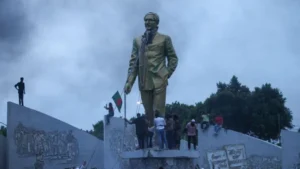Euphoria in Bangladesh as Prime Minister Sheikh Hasina Flees the Country

Dhaka, Bangladesh – The streets of Bangladesh erupted in celebration as Prime Minister Sheikh Hasina, 76, fled the country following weeks of deadly anti-government protests. Her resignation marks the end of over two decades of political dominance.
Historic Resignation
On Monday, Ms. Hasina reportedly landed in India, leading to jubilant crowds storming the prime ministerial palace. Reports of looting and vandalism emerged as protesters took out their frustrations on her former residence.
Immediate Reactions and Political Shifts
President Mohammed Shahabuddin quickly acted by ordering the release of jailed former prime minister Khaleda Zia and all students detained during the recent protests against the government job quota system. He announced plans for an interim government, new elections, and the lifting of the national curfew.
Violent Protests and Unrest
Monday saw significant unrest in Dhaka, with attacks on police and government buildings. Protesters attempted to dismantle a statue of independence leader Sheikh Mujibur Rahman, Ms. Hasina’s father. The death toll from the day’s events varies, with AFP reporting 66 fatalities and local sources suggesting as many as 135.
A Power Vacuum
Ms. Hasina’s departure leaves a significant void in Bangladeshi politics, historically marked by the rivalry between her Awami League and the Bangladesh Nationalist Party. The country’s history of military coups, the latest in 2007, adds to the uncertainty.
International Reactions
The US commended the Bangladeshi army for its restraint, advocating for an interim government, while the EU urged a peaceful transition towards democracy. Neighboring India, a regional power, has not yet issued an official response.
Rising Challenges
Debapriya Bhattacharya, a senior economist at the Centre for Policy Dialogue in Dhaka, expressed concern over escalating attacks on the Hindu minority, linked to the perception of Indian support for Hasina’s government. The interim government faces immediate challenges in restoring law and order and protecting religious minorities.
A Political Dynasty Ends
Allies of Ms. Hasina suggest she will not return to politics. Her son, Sajeeb Wazed Joy, indicated that their family is done with politics after this turbulent period. Critics of Ms. Hasina highlight her tenure’s darker aspects, including forced disappearances and the suppression of opposition.
The Path Forward
Protests originally ignited by the controversial government job quota system have now morphed into a broader demand for democratic reforms. Dr. Chietigj Bajpaee of Chatham House emphasized the role of high unemployment and youth frustration in fueling the unrest. The new government faces significant pressure to address these demands, improve job opportunities, and reform the education system.
As Bangladesh navigates this critical juncture, the world watches closely, hoping for a peaceful and democratic resolution to the ongoing crisis.
